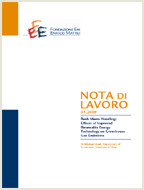Can EU’s Decarbonisation Agenda Break the State-Company Axis in the Power Sector?

04.06.2015
O13, Q4, Q42, Q48
Decarbonisation, Electricity generation, Energy policy, European Union, Interconnectors, Member States, Political negotiations, Policy making, Power grid, Power transmission system, Power pools, Power system, Regulatory framework, Renewable energy
Energy: Resources and Markets
Matteo Manera
Europe’s power system is still marked by a distinct national component, and despite some regions with strongly integrated power systems, electricity supply today still has a largely national basis. Policies to decarbonise the power sector may fundamentally alter this situation, because power generation from renewable, carbon-neutral sources may require large, flexible, and heterogenic power pools as backdrop for efficient operation. Integration of little or non-integrated parts of the European power system is therefore a key element for the successful transition of the European power sector towards more renewables. But a development which fosters integration, growing transmission distances and bigger markets will likely lead to a reshuffling of allocation of power generation capacity in Europe. As with any fundamental policy change, decarbonisation of the power sector will create new winners and losers. Moreover, an integrated power system will probably cause new dependencies on the good-will of neighbouring countries. Europe is hence confronted with a ‘catch-22’: On the one hand, policy makers see the advantages of renewables and the exploitation of domestic energy resources, yet the necessary adaptations of power generation, distribution and consumption implies the risk of ‘harming’ the national power sector. EU policies to increase renewables and to create an internal energy market (IEM) thus aim at ameliorating this situation by e.g. both stimulating construction of renewable energy infrastructure and creating more interconnectors between member states. But due to various interests at the national level, member states’ levels of ambitions in contributing to achieving these overarching targets vary a lot. The instruments the European Union has at her hands will therefore have to be refined if the reluctance of member states to integrate power systems is to be overcome.
